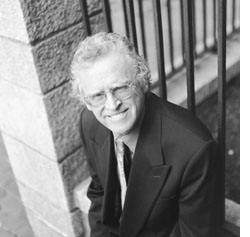
Fall
1999
Crossing linguistic and cultural boundaries
Super-power sense and sensibility
![]()
![]()
Soundings is a publication of the School of Humanities and Social Science at MIT
Comments and questions to www-shss@mit.edu
Pathbreakers
 "Humanities provides a mechanism
for sorting out the universe, for selecting and choosing your course."
"Humanities provides a mechanism
for sorting out the universe, for selecting and choosing your course."
Graduates of MIT are making a difference in a multitude of arenas. With distinction and panache, they are shaping the course of events"—as teachers and writers, inventors and entrepreneurs, developers of national policy and creators of social agendas. In this profile, we depart from our usual course of highlighting a graduate of the School of Humanities and Social Science to focus on an Institute graduate whose immersion in the humanities has led him to chart new terrain.
No stranger to synthesis
While raking leaves in his yard in Berkeley, California in the 1940s, the renowned physicist Ernest Orlando Lawrence was contemplating television, which then existed only in black and white. ‘Some day it will be in color,' he mused. Raking a few more leaves, he realized that eventually there would be a tube to display color images. Thinking further, he thought, ‘Someone has to invent it.' After a few more rakes he concluded, ‘It might as well be me.' Putting down his rake, Lawrence went into his house and within half an hour invented the color television tube.
Tom Hagan, electrical engineering '51, relays the anecdote to illustrate the moxie needed to make something out of nothing, a subject he knows a bit about. Responsible for a slew of technology firsts, Hagan is co-founder of three companies: Adage, which pioneered interactive computer graphics technology and brought it to fields ranging from CAD/CAM and molecular modeling to oil exploration and aircraft pilot training; Camex, the first company to create a successful all-electronic pre-press system for the printing and publishing field; and most recently, Actioneer, whose ‘unbrowser' speeds access to Web e-service, bypassing the need for point-and-click navigation.
"The idea that you can make something out of nothing doesn't come out of a course analyzing the kinematics of objects or other analytical [approaches]. It may come out of reading a novel or being forced to sit in front of a blank sheet of paper and compose an essay," says the engineering innovator. "In other words, the humanities is an excellent vehicle to induce people to create, to do what they may not have known they could do."
With his broad frame of reference"—Hagan's conversations are peppered with references to John Milton, Emily Dickinson, Mark Twain, Fyodor Dostoevsky and Zen and Sufi aphorisms "—the high-tech CEO waxes passionate about the humanities. On a practical level, he notes, they have honed his entrepreneurial skills. "You can't be the leader of a company without being able to communicate. You have to be able to stand back from what's happening, realize the bigger pattern, articulate the possibilities and charge people with enthusiasm," he says, adding, "the biggest disappointments I've had in hiring are with people who have excellent technical skills but can't synthesize anything. The humanities develops the ability to frame ideas, the ability to have ideas."
Viewing his MIT student days as a study in contrast, Hagan describes his relationship with the school of the early 1950s as "love-hate. It was completely impersonal. Science and technology were pumped at us by the proverbial MIT fire hose. We were taught how to analyze everything and synthesize nothing." Noting that immense changes have taken place in the interim, Hagan says it was his undergraduate experience, in part, that led him to serve the MIT Visiting Committee for the Humanities, which he was involved with between 1992 and 1997.
Deeply appreciating one or two of his undergraduate teachers and courses, including a seminar on Greek cosmogony with Norbert Wiener, Hagan credits his freshman survey literature course with opening his eyes to a vast world. "I was lit up," he says. "I managed thereafter to get a good liberal education. But I did it almost on my own."
The expanded world-view that Hagan has since developed has helped him navigate well beyond the entrepreneurial world. "Humanities provides a mechanism for sorting out the universe, for selecting and choosing your course," he says, adding, "I can't imagine living a life without the richness I've realized from reading e. e. cummings and Seamus Heaney. They get me at a place that nothing else does. You come across a complete poem or a phrase in a poem that sticks and wedges its way into your soul, your psyche. That is important to me in the same way that green leaves on trees are important. It makes me glad to be alive."
![]()
Copyright © 2000 Massachusetts
Institute of Technology